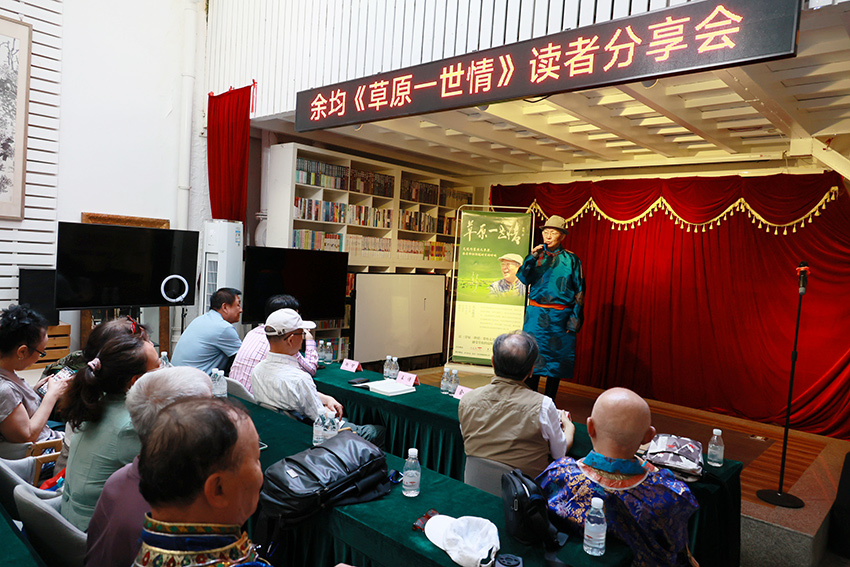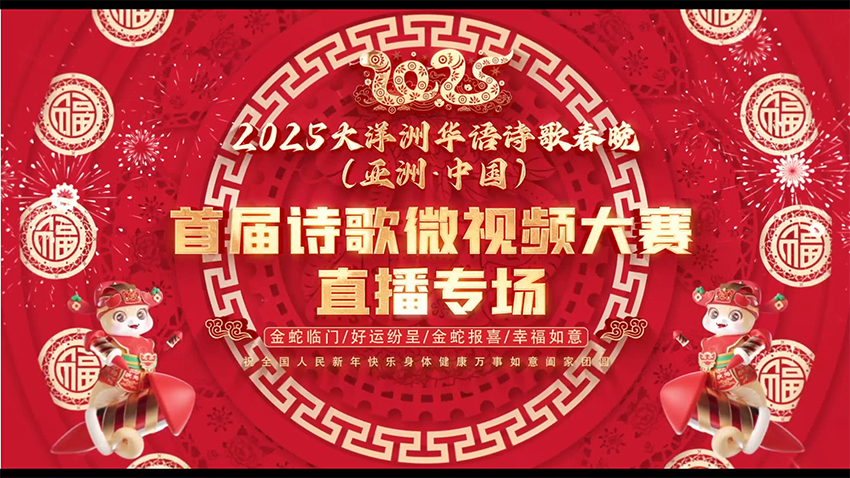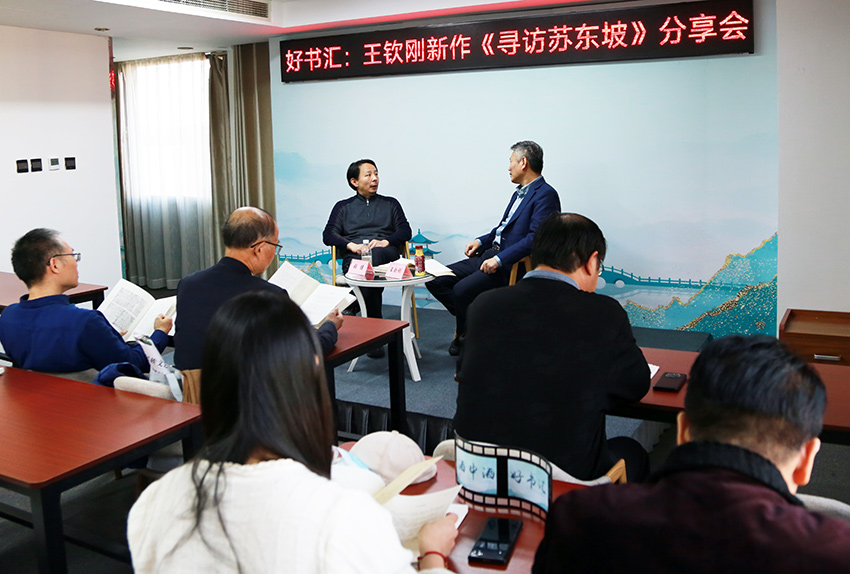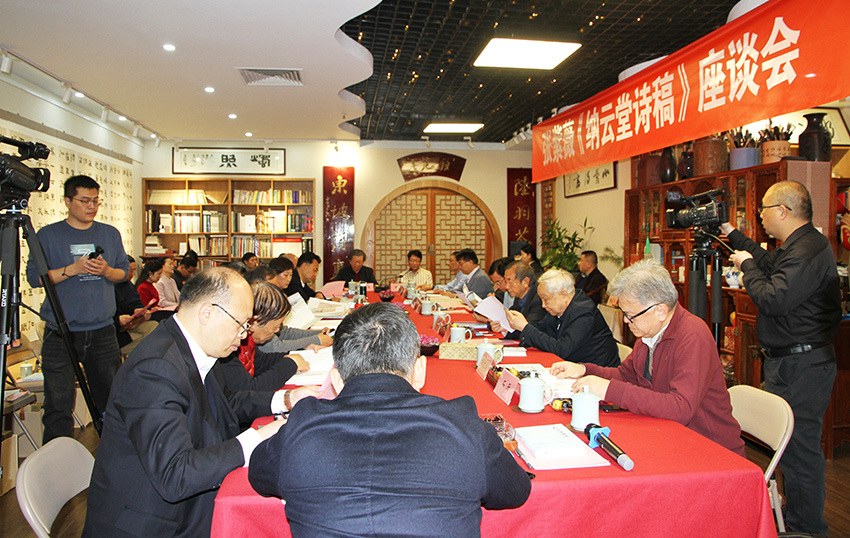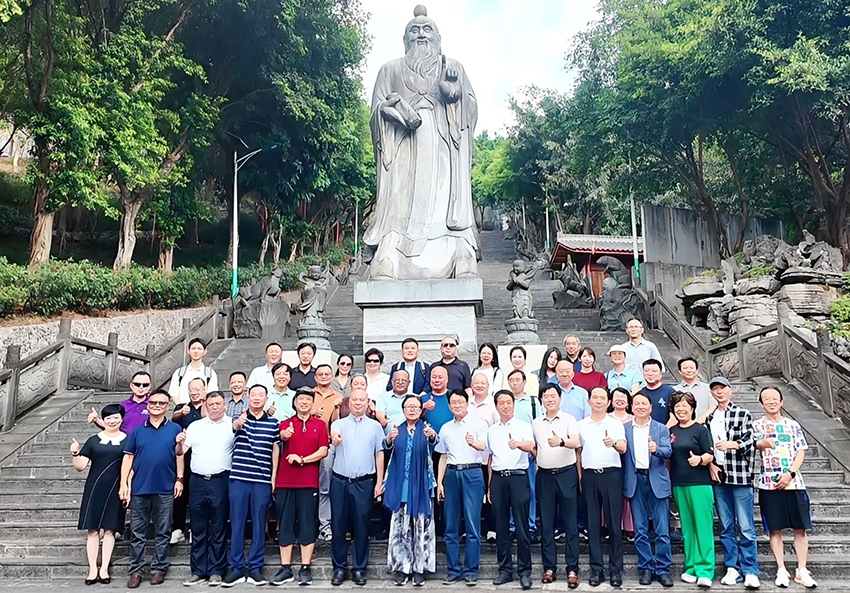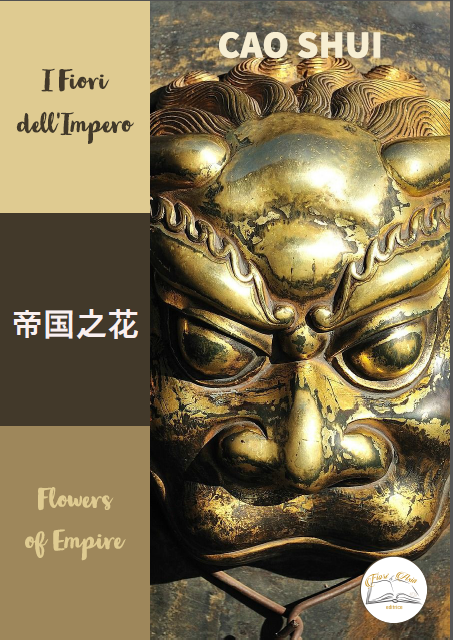
從黑暗到光明
——曹誰的《帝國之花》是年輕一代渴望領導新世界的信號
[印度]拉蒂·塞克森納 文
[中國]曹誰 譯
在印度《奧義書》中有一的贊美詩說:引導我們從黑暗走向光明,引導我們從無知走向知識。這就是一個詩人所做的,當他從給定的詞匯中創造詞匯時,在東方哲學中,詞語的權力被尊為創作者。
我們意識到,智慧地使用詞匯會帶來一個更美好的世界。當我讀到盧茜拉·特拉帕佐對曹誰的采訪時,我并不驚訝地發現這位詩人接受了他童年時害怕陰影的事實,對陰影或黑暗的恐懼意味著追求更美好的世界。
大多數人總是被浸透在悲傷和痛苦中的話語所吸引,這就是為什么這樣的詩很容易引人入勝。
要寫出一首能帶來普遍性和幸福感的詩并不容易,要做到這一點,詩人必須知識淵博,思想開放。
閱讀曹誰的詩,我很高興看到他的表情和情感的普遍性。作為一名當代詩人,曹誰的視野不同于他所處的土地上的其他詩人,并將他與另一個世界聯系起來。
曹誰寫的《帝國之花》一書最大的吸引力是對悲傷的抵抗,這有時是由人們創造的。這個世界是一個舞臺,他想站在中心,面對快樂和悲傷。
你是世界中一個最普通的人
所有的人仍不會放過你
他們為你歌舞
一齊助你悲傷
直到你絕望
直到你離開這個世界
他們就會一哄而散
去為下一個人哀歌
(《大悲舞》)
曹誰不是在改寫歷史,而是從不同的文明中提取符號來展示普遍的真理,這應該由哲學家來教導。所有偉大的文明都是在恐懼和力量中誕生的。但是他們在哪里?他們能夠通過民間流傳的故事和對人類的熱愛而保持完整。他在詩中提出了這個問題。鐵獅子為墓主人鎮守墳墓
雅利安人的馬匹向西沖出
羌人族系的孤舟向東劃動
墓中的寶物都靜靜沉睡
蒙古帝國的鐵蹄隨著日出布滿亞細亞
大英帝國的帆船隨著日落使出歐羅巴
墓中的寶物都安然無恙
(《鐵獅子墳》)
可悲的是,歷史只記得殘酷,難道這不是強調黑暗而不是光明的一種方式嗎?難道我們不應該賦予殺戮更多的意義而不是賦予生命嗎?我引用他自己的話,這解釋得更好。
崇禎帝在明史中名垂千古
美狄亞在悲劇中傳播廣泛
今天這個阿姑山村的村姑楊改蘭
用了崇禎帝的斧頭和美狄亞的毒藥
殺死崇禎帝和美狄亞加起來的孩子
崇禎帝和美狄亞有崇高的追求
你卻只是想讓孩子們脫離痛苦
(《崇禎帝和美狄亞架著楊改蘭自絕于盛世》)
曹誰不僅在他的詩歌中帶來了歷史,而且還以如此優美的方式使用了民間故事,使其與當代世界相關。他要唱愛情的歌,那只能面對殘酷。
在這茫茫的人世
我們相愛多么不易
我們在生和死的邊際奔跑
我們仰面對著星空說
任百世千劫的大風吹過
生在一起,死在一起
(《大風歌》)
幸福就像一朵小花,它一步也走不動,但隨著它的碎片飄向許多地方,這些線條在這場流行病中有多貼切。
紫紅色的顏色是高貴
甜滋滋的味道是優雅
這是我們過家家的飲品
這是我們走親戚的酒水
他可以在我們練武功后助興
他可以在我們打勝仗后慶功
(《壺壺喝酒》)
我希望讀者仔細閱讀他的詩,我用他的一些詩句總結我的評論,這些詩句傳達了所有宗教、所有語言和所有領導人只傳達一個信息,那就是閱讀詩歌。詩歌是文字的力量,它可以治愈疾病,也可以治療疾病。
華夏人用華夏語說黃帝
希臘人用希臘語說宙斯
印度人用印度語說因陀羅
猶太人用猶太語說耶和華
埃及人用埃及語說太陽神拉
波斯人用波斯語說馬爾杜克
他們爭論不休
我們聽不懂他們的語言
卻知道他們在說什么
我們誦讀一首通天塔之歌
舌戰全世界的人
他們全都被震撼
(《我們的一個夢勝過十萬種人生》)
對于渴望領導新世界的年輕一代來說,這是一個非常有力的信號。
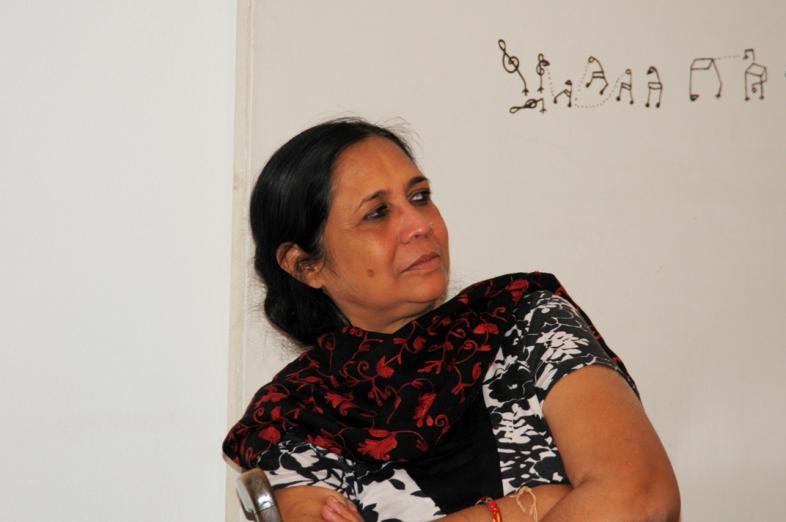
拉蒂·薩克森納(Rati Saxena),印度著名詩人、翻譯家、哲學博士,她研究文化、歷史和古代文學以及哲學。她在《阿闥婆吠陀》學研究上,取得哲學碩士和哲學博士學位,她在印度古代文學的研究上做了更多的工作。在這個研究方向上,她在英迪拉·甘地聯誼會下的作品是《心靈的種子:一種通向阿塔瓦吠陀的新方法》,發表了許多期刊的文章。她有六本印地語詩集和四本英語詩集(翻譯或改編)。她翻譯了15本書,主要是從馬拉雅拉姆語到印地語,以及5本詩集(國際詩人),從英語到印地語。作為一個天生的旅行者,她有兩本游記。她還寫了一本回憶錄《一切都是過去時》,講述了阿亞帕·帕尼克爾的詩歌之旅,以及一本關于巴拉曼雅瑪詩歌的評論集。她關于詩歌治療的書出版于哈瓦卡爾出版社,這是一個打開的拳頭,講述從遙遠的過去到現在到未來的詩歌治療。她的詩集被國際詩人翻譯成許多國際語言,如意大利語、愛爾蘭語、越南語、西班牙語、愛沙尼亞語、塞爾維亞語、英語、中文和土耳其語。她被邀請參加了30多個國際詩歌節,在德國和中國有過三次居留權。她是德國多語種文學雜志WürZarT編委,她是國際科學委員會squilibri的成員,她的詩入選日本Jaxa宇宙航空研究開發機構太空任務。2004年她獲得英迪拉·甘地國家藝術中心獎學金,2000年獲得薩希提亞阿卡德米翻譯獎,2001年獲得特拉凡科國家銀行詩歌獎,2016年獲得納吉·納曼文學獎(國際)全集獎,2018年獲得中國詩歌DJS(艾米莉·迪金森)翻譯獎、拉賈斯坦邦帕特里卡獎年度最佳詩人。
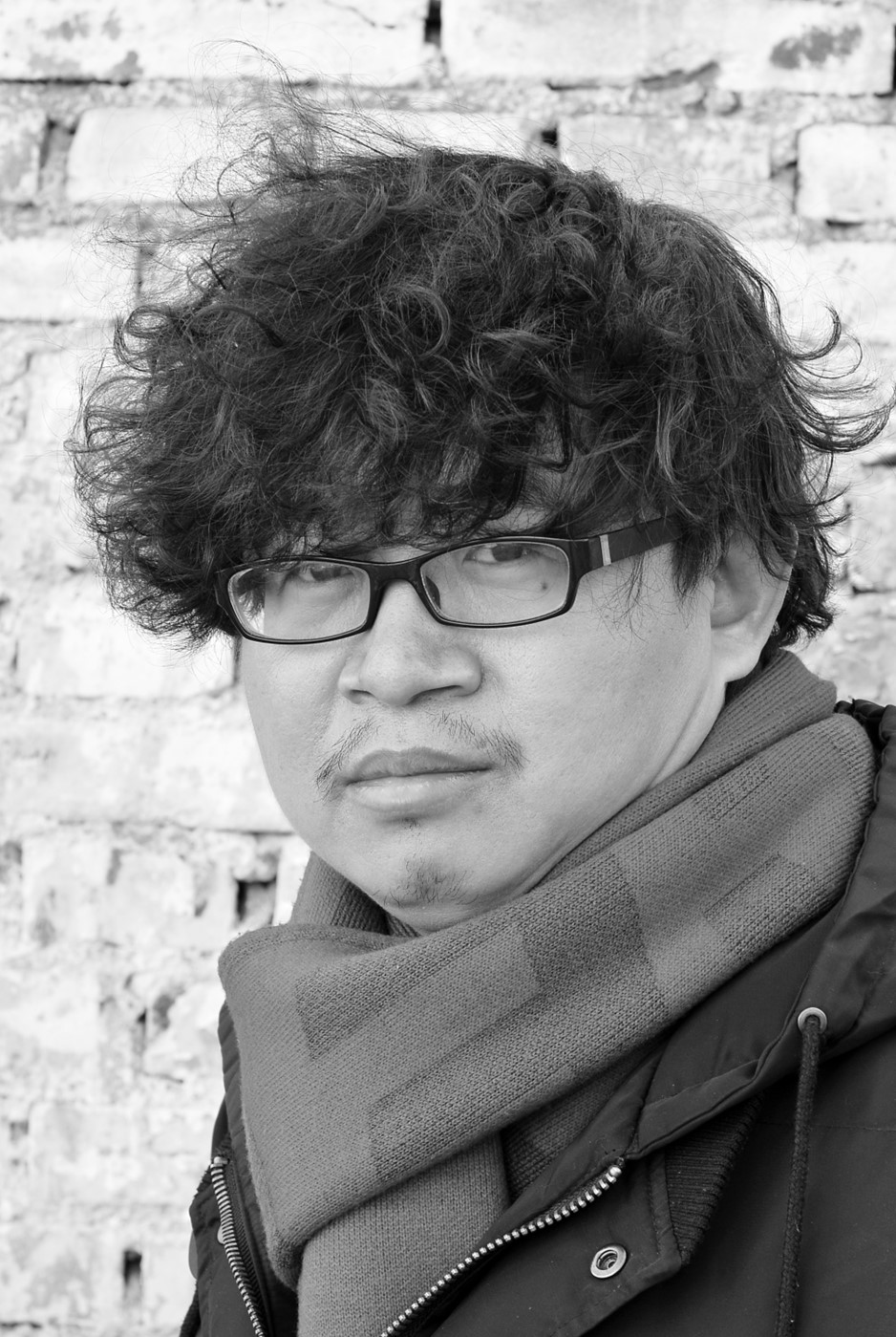
曹誰簡介:
曹誰,詩人、小說家、劇作家、翻譯家,北京師范大學文學碩士,中國民主同盟盟員。原名曹宏波,字亞歐,號通天塔主。曾參加魯迅文學院第14屆作家高研班、中國文聯第9屆編劇高研班、中國作協第10次作代會、第8次青創會。1983年生于山西榆社,2008年去職遠游,在西藏、新疆周游數月而返青海,開始職業寫作生涯,現居北京。2007年發起大詩主義運動,2017年倡導劇小說運動,2018年發起曹伊之爭。著有詩集《亞歐大陸地史詩》《通天塔之歌》《帝國之花》等十部,長篇小說《巴別塔尖》《昆侖秘史》(三部曲)《雪豹王子》等十部,文集《可可西里動物王國》《西藏新疆游歷記》等三部,翻譯《理想國的歌聲》《透明的時間》等三部,電影劇本《昆侖決》《子彈上膛》《功夫小鬼》、電視劇本《孔雀王》和舞臺劇本《雪豹王子》等百余部集。作品發表于《人民文學》《詩刊》《作家》等文學雜志,入選上百部權威選本。有多部長篇小說改編為影視劇、廣播劇、舞臺劇等。有作品翻譯為英、法、德、俄、日、韓、印地、意大利、西班牙、土耳其、阿拉伯等20余種文字,在國際詩壇有三十多位著名詩人寫作評論,被印度杰出詩人拉蒂·薩克塞納稱為是“領導新世界的年輕一代”的代表詩人。曾獲首屆中國青年詩人獎、第5屆青海青年文學獎之“文學之星”、第4屆曹禺杯劇本獎、第8屆意大利羅馬當代國際詩歌藝術學院獎之阿波羅·狄奧尼索斯詩歌獎詩歌獎、第12屆俄羅斯金騎士獎、第5屆中國詩歌春晚十大新聞人物等50多項省級以上文藝獎。曾參加第30屆麥德林國際詩歌節、第26屆哈瓦那國際詩歌節、第14屆印度Kritya國際詩歌節、第4屆青海湖國際詩歌節等多個國際詩歌節。系中國作家協會會員,中國電影文學學會會員,世界詩歌運動成員,《大詩刊》主編,《漢詩三百首》執行主編,《世界詩歌》副主編,《詩歌周刊》副主編,世界詩歌網副總編,博鰲國際詩歌節常務副秘書長,絲綢之路國際聯合會副主席,華語詩歌春晚副總導演。
From Darkness To Light By Cao Shui:The Flowers Of The Empire Is A Sign Of A Desire To Lead The New World
By Rati Saxena( India)
There is an Upanishadic hymn which says – lead us from darkness to light, lead us from ignorance to knowledge. This is what a poet does, when he creates words from a given vocabulary. In the Eastern philosophy, word power is revered as Creator.
We realize that wisely used words leads to a better world. When I was reading an interview of Cao Shui by Lucilla Trapazzo, I was not surprised to know that the poet accepted that in his childhood he was afraid of shadows. Fear towards shadow or darkness means aiming for better world.
Invariably most people are attracted to words drenched in sorrow and pain. That is why such poetry attracts easily.
To be able to write a poem which leads to universality and happiness is not easy. To achieve that, the poet has to be knowledgeable and open minded.
Reading Cao Shui, I am happy to see the universality in his expressions and emotions. Being a contemporary poet, Cao Shui’s vision is different from the poets from his land, and that connects him to other world.
The biggest attraction of the book “the Flower of Empire “written by Cao Shui is the resistance to sorrow, which is sometimes created by people. This world is a stage, and he wants to stand in the centre, and face both happiness and sorrow -
You are the most ordinary person,
yet no one will let you be.
They sing for you, dance for you
to aid your sorrow process.
Until you give up all hope,
(GREAT DANCE OF SORROW)
Time is like the wheel over Tian'anmen gate,
which is built and destroyed by many powers,
and ordinary man is keep turning this wheel in the hope of heaven
until he himself gets gray hair-
We spin in the shadow of the wheel.
We're inside, but also outside.
It's over before it starts.
We keep spinning and become dizzy,
until our hair turns grey,
until we turn to dust and smoke.
Cao is not rewriting history, but is taking symbols from different civilizations to show the universal truth, which ought to be taught by philosophers. All great civilizations are created with fear and power. But where are they? They were able to remain intact through stories carried forward by common people and love for humanity. He puts the question-
Iron lions guard the grave and it’s owner.
Aryan people’s horses rushed westward,
Qiang people's boats sailed east,
but the treasures in the tomb were sleeping quietly.
The cavalry of the Mongol Empire spread over Asia
at sunrise,
British Empire’s boats sailed from Europe at sunset,
but all the treasures in the tomb were safe.
Sadly history remembers only cruelty, is it not a way to give emphasis to darkness over light? Are we not giving more significance on killing rather than giving life? I quote his own words, which explains better –
Li Zicheng's troops break into Beijing city;
Emperor Chongzhen killed his two daughters with an axe,
and hanged himself on the top of Jingshan Mountain.
--------
Today, Yang Gailan, a countryside woman
in Agushan Village
has used Emperor Chongzhen's axe and
Princess Medea's poison
to kill the children again.
(EMPEROR CHONGZHEN AND PRINCESS MEDEA TAKE YANG GAILAN AND LEAVE FOR AN IDEAL WORLD)
Cao not only brings history in his poems , but also uses folk tales in such a beautiful way that it becomes relevant to contemporary world. He want to sing the songs for love, and that only can face cruelity.
how hard it is for us to fall in love!
We are running on the border between life and death.
We look up at the stars and say:
“Let the gale of hundreds of generations
of catastrophes blow away!”
We are born together and we will die together.
(SONG OF GALE)
Happiness is like a little flower , which cannot take a single step, but with his fragments travel to many places, how apt are these lines in this pandemic, -
I have seen a little flower,
which couldn’t move a little step.
……
Plum-red is a refined color.
Sweet taste is superfine.
This is the drink of theatre actors,
this is the drink to take when you visit your relatives.
It can lift our moods after we practice martial arts.
It can celebrate us after a victory in battle.
(FLOWER-JUG)
I want readers to read his poems carefully and I sum up my note with some of his lines which convey that all religions , all languages and all leaders give only one message , that is to read poetry. Poetry is word power, which heals, which is therapeutic.
the Greeks spoke of Zeus in Greek;
the Indians spoke of Brahma in Hindi;
the Jews spoke of Jehovah in Jewish;
the Egyptians spoke of Ra, the God of Sun, in Egyptian;
the Persians spoke of Marduk in Persian.
They argued endlessly.
We couldn’t understand their language,
but we knew what they were talking about.
We read a lyric of the Tower of Babel:
words against people from all over the world.
This is a very powerful message for the young generation who aspire to lead the new world.
Dr. Rati Saxena – Rati Saxena is a Poet, Translator, and Editor .she is a student of culture, history and ancient literature, and philosophy by passion. Thus her soul is wandering in these different directions. Being the student of Vedic studies in honours and Masters, having done PhD on subject related to Atharvaveda, she has worked more in restudy of ancient literature. In this direction, her work under Indira Gandhi Fellowship is – “The seed of mind - A fresh approach to Atharvaveda” study along many articles for journals. She has six collections of poetry in Hindi and four in English (Translated or rewritten). She has Translate fifteen books mostly from Malayalam to Hindi, and five poetry books (International poets) from English to Hindi. Being a natural Traveler, she has two travelogues in her credit. She has also written a Memoire- “Everything is past tense” about Ayyappa Paniker’s poetic journey and one book of criticism on Balamanyaama’s poetry. Her book on poetry therapy came out with Hawakal publications, - A fist which opens, a poetry therapy from distant past to present future. Her poetry books have been translated in to many internationals languages like Italian, Irish, Vietnamese, Spanish, Estonian, Serbian, English and Turkey languages by international poets. She has been invited to more than 30 poetry festivals. She has been in three residencies in Germany and China. Member of the journal’s editorial board Multilingual Journal of Literature and Opto-Art “WürZarT,”2. She is member of an international scientific board, experience in musical and literary fields (www.squilibri.it). Her poem was also part of space mission by Jaxa, Japan, along with 24 other poems. She is not big award catcher, still a few came to her automatically -Fellowship by Indira Gandhi National Centre for Arts in 2004-5,Sahitya Akademi Award for Translation 2000 ,State Bank of Travancore Award for poetry 2001, Naji Naaman’s Literary Prizes (International) for complete work 2016 , DJS Translation award for Chinese poetry (DJS is the acronym in Chinese for (Emily) Dickinson, the American woman poet.) 2018, and best poet of the year by Rajasthan Patrika Award biggest in the country for signal poem.
Bio of Cao Shui
Cao Shui(Chinese: 曹誰;pinyin: Cáo Shuí), also Shawn Cao (born in Jun 5, 1982), is a Chinese poet, novelist, screenwriter and translator. He is a representative figure of Chinese Contemporary Literature. He leads “the Greatpoeticism” movement. In his “Manifesto of Greatpoem”, he aims to integrate sacred and secular cultures, oriental and occidental cultures, ancient and modern cultures in Chinese literature. In 2008, he resigned from a newspaper and traveled around Tibet and Xinjiang, which is the center of Eurasia or the World in his view. His novels Secret of Heaven trilogy tells the whole developing history of human civilization. His most notable works includes Epic of Eurasia, the already mentioned trilogy and King Peacock (TV series). In his works, he extracts elements of various ancient human civilizations, from Babylon to the west to Judea, Egypt, Greece, to the east to Persia, India, China, and uses these elements to reconstruct a new Utopian human homeland, which always described as Eurasia, the Top of the Tower of Babel or Kunlun Mountains (Heaven Mountains). So far twenty books of Cao Shui have been published, including five poem collections, three essay collections, ten novels, three translations and one hundred episodes TV series and films. His works have been translated into English, Italian, Spanish, French, German, Danish, Polish, Russian, Hungarian, Croatian, Slovenian, Turkish, Arabic, Japanese, Korean, Hindi, Nepali, Vietnamese, Tibetan, Mongolian, etc. He has been invited to participate in the 30th Medellin International Poetry Festival, the 26th Havana International Poetry Festival, the 14th Kritya International Poetry Festival in India and the 4th Qinghai Lake International Poetry Festival. He is a member of China Writers Association, China Film Association and China Poetry Society. He is also chief editor of Great Poetry, deputy editor in chief of World Poetry, secretary general of Boao International Poetry Festival and vice president of the Silk Road International Poetry Festival. Currently he lives in Beijing, and works as a professional writer and screenwriter.
注:本文已獲作者授權發布
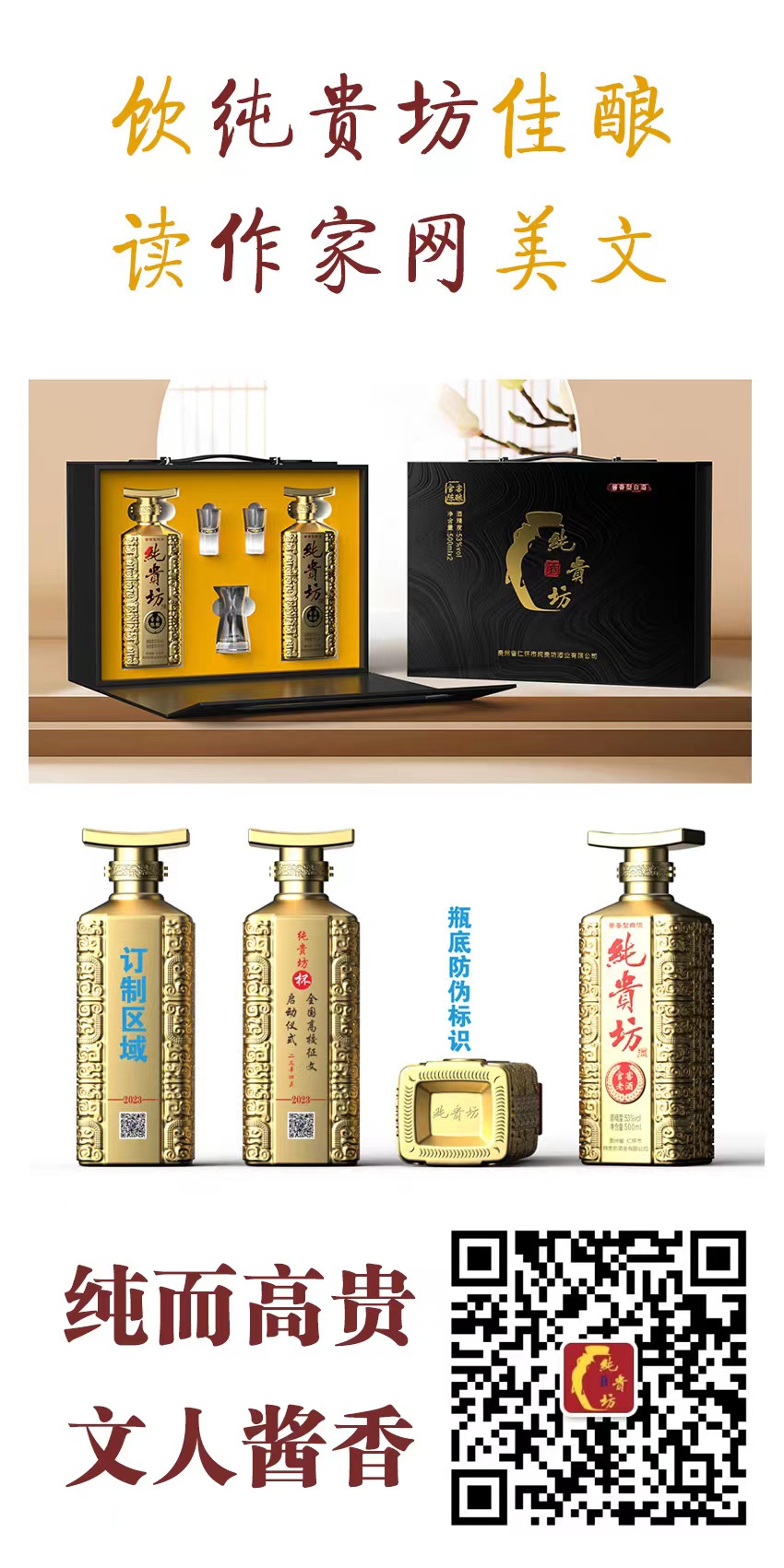


 純貴坊酒業
純貴坊酒業
